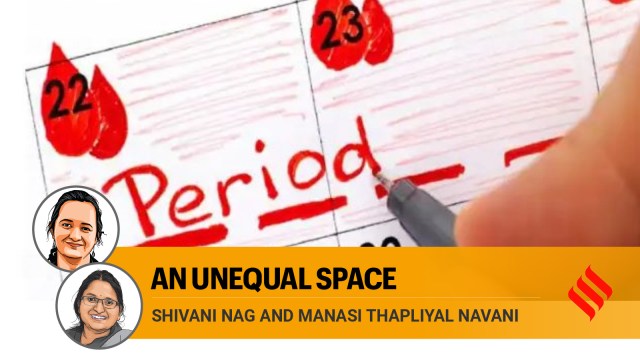
Recently, when a question on menstruation leave for women was posed to the Union Minister for Women and Child Development Smriti Irani, she said in response, “As a menstruating woman, I would say that menstruation or a menstruation cycle is not a handicap.” She added, while responding to a supplementary question from Manoj Jha, that “We should not propose issues where women are in some way denied an equal opportunity just because somebody who does not menstruate has a particular viewpoint about menstruation”.
As women who work, who menstruate and who have been in conversations with other women who work for a long time now, we felt that there was a need to reiterate the difference between normalising menstruation and invisibilising the experience of menstruation. In 2015, a popular campaign on college campuses to normalise conversations around menstruation kicked off, called “Happy to Bleed”. For one of us who does have PCOS, while the spirit of the campaign was much appreciated, one also thought, “embarrassed to bleed — NO, but happy — not exactly”, as irregular periods meant negotiating with an oxymoronic “regular” uncertainty and very painful periods. Why did normalisation have to be accompanied by undermining.
In our culture, women were isolated and excluded from household labour because of prejudices around menstruation and its association with “pollution”. A Sadhguru would point out the “scientific” rationale for giving women a break during their period, as their biology requires it. Such “scientific” logic inspires discrimination and segregation. It has harmed the bodily and emotional integrity of generations of women, for whom sometimes the exclusion from the “workspace” of home served as a respite from toil and sweat, and at all other times, as a reminder of the inferiority of their ontological status. It is a testimony to the deep-seated patriarchal anxiety that the minister, as a woman, also attests to the very real possibility of employers (men) beginning to jeopardise work experiences or career progressions of menstruating women. But what does not help at all is to see the minister accepting and hence, legitimising the patriarchal logic that enables the discrimination. Why must our understanding of “work” and the nature of our workplaces be defined assuming that only a man could be a worker, and hence it is his physiology which must set the standards of expectations?
The writers of this article have spent the last couple of years conversing with women who work outside the domestic space and one of the several themes that emerged was the experience of and the struggles accompanying menstruation. Many suffer from “dysmenorrhea”, a condition where periods are accompanied by severe cramps and pelvic pain and often also with heavy flow or clotting. An absence of a provision like menstruation leaves means exhausting all of one’s limited casual leaves (only if and when possible) to be able to stay home during this period of immense discomfort and pain. Women have also talked about the infrastructural lacks, such as clean toilets, regular water supply, hygienic changing rooms, absence of emergency sanitary pads and resting spaces where one could take a few minutes or an hour off while working, exposing once again how our workplaces are designed with a male as the prototype worker. There is no denying that menstruation can also be experienced as normal, painless and discomfort-free by many, but these many are not all and the demands of inclusive and gender-just workplaces require that they be acknowledging and accommodating of all.
When the minister acknowledges that a provision of menstrual leave may lead to denial of opportunities to women, isn’t the same true of provisions of maternity and child care leaves? In our conversations with women, one also reported that she nearly lost out on a job opportunity due to her pregnancy. A desire to embrace motherhood as a professionally working woman was termed “irresponsible” by some at the workplace. The logic that women’s physiology and biological roles could result in them being denied professional opportunities needs to be unequivocally challenged and rejected, rather than telling women that the only way they can survive in workspaces is if they pretend their physiology isn’t what it is and to strive to become like “men”.
There is also an assumption that if this provision is made, women who may not experience difficulty related to periods would also take leaves, an underlying belief being that any reason to shirk work is always lapped up. Quite to the contrary, our interviews with women revealed that many whose workplaces are designed in ways that affirm and acknowledge women’s presence actually look forward to going there. At home, whether in pain or not, women are rarely able to escape domestic responsibilities to rest. Many treasure their office desks or cabins, their bonds with colleagues and a space where they can be valued as a professional.
Yes, it is important to recognise the history and memories of segregation and humiliation which women in India have battled to overcome. For one of the writer’s mothers, going to the office on her period days required her to also enter the kitchen space, and work with water in the 1980s. She spent enough energy fighting to debunk the pollution myth — that her touching pickles would rot them and food cooked by her would pollute everyone. What was needed was kindness, compassion and consideration then, and that is exactly what is needed now. The state/bureaucracy needs to provide medical recognition to difficulties faced by menstruating women, not to essentialise women in the labour force but as a basic human premise which is not threatened by women asking for change based on their biology.
The authors are assistant professors in the School of Education Studies at B R Ambedkar University, Delhi and are currently engaged in research on women’s experiences at workplaces, in particular, academia